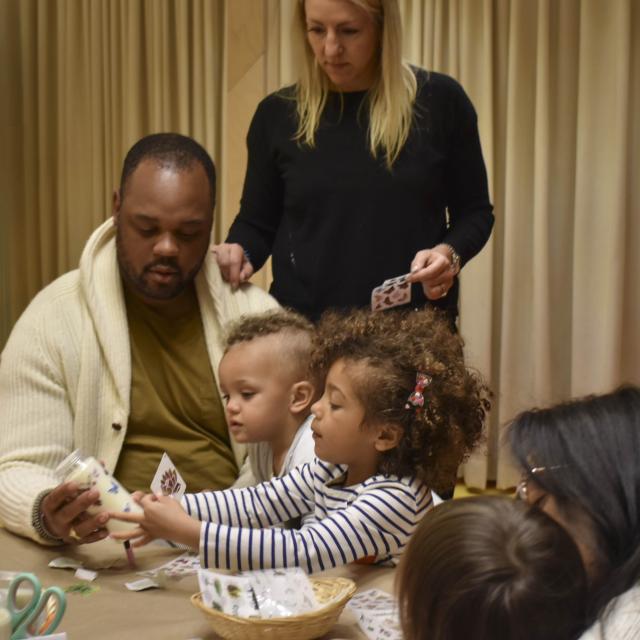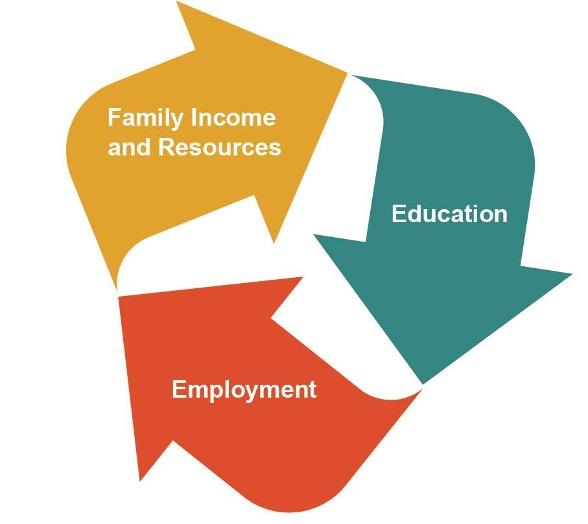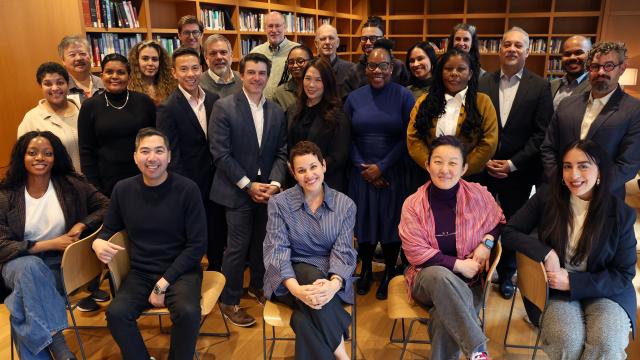Neighborhood Support Grants

Our Vision: An Emotionally Well Community
In 2023, Trinity's Neighborhood Support team launched a grants program to make deeper investments into the emotional well-being of our community.
Marginalized and under-resourced communities face multiple, intersecting oppressions — from systemic racism and policing to poverty, underfunded public schools, and violence — that create toxic stress. We now have a well-established body of research demonstrating the significant and deteriorating impact of toxic stress on health and well-being, especially for children and families deprived of safety nets.
This dynamic was exacerbated dramatically by the pandemic, and continues to worsen, with communities and families managing the consequences of toxic stress with minimal to no resources. Their struggle is compounded by the lack of recognition and funding for programs that support a holistic, multi-generational approach to mental health.
Our goal with this new grants program is to help begin to fill this gap in funding, particularly for programs that take a well-rounded approach to emotional well-being with a focus on children.
We seek to co-develop — alongside each neighborhood in Lower Manhattan — the necessary supports that help strengthen our communities and yield overall child, family, and community well-being.
For this new grants program we prefer that your organization be both located in and serving communities and individuals who live below 14th Street in Manhattan.
Read more about how we developed this funding strategy with the community.
Our Focus: The Emotionally Well Child
The emotional well-being of children is directly tied to the functioning of their community, schools, caregivers, and the families with which they live. When relationships are reliably responsible and supportive, they can actually buffer children from the adverse effects of other stressors. Reducing stressors affecting children requires addressing the stresses on their families. When children are emotionally well, they’re better able to:
- Reach emotional milestones
- Reach developmental milestones
- Learn healthy social skills
- Learn how to cope when problems arise
- Have a positive quality of life
- Function at home and in school
Our Strategy: Resourcing Whole-Family Models of Care
With this special initiative, Trinity's Neighborhood Support team is maintaining our commitment to Lower Manhattan, specifically communities that lie south of 14th Street. Our vision is an emotionally well community, with a strategic focus on the emotional well-being of children, from prenatal development through age 21.
Our funding strategy was developed to lift up models of care that embrace whole families, delivered by organizations that know and work in the community and who center the community in finding solutions.
Over the course of 2022, Trinity conducted and released a Needs Assessment and Policy Brief informed by residents, community leaders, business owners, and other key stakeholders to better understand the pressing challenges facing Lower Manhattan. The Needs Assessment surfaced these critical themes:
The relationship between three factors — family income and resources, education, and employment — consistently emerged as a driver of family well-being. This causal loop is virtuous (i.e., the more resources you have right now, the more you will have in the future) to the families with enough resources, and vicious for families without adequate resources (i.e., the fewer resources you have right now, the less you and your children will have in the future).
To truly thrive, families need to:
- Be able to navigate systems related to education, social services, and healthcare
- Obtain affordable, quality childcare
- Have the space to build community and deepen relationships
How does this vicious cycle contribute to and perpetuate toxic stress?
- Families caught in this vicious cycle are more likely to experience greater stress.
- When stress is not buffered, it can lead to serious mental health challenges.
- When mental health is not addressed, it can feed the vicious cycle.
- Poor mental health can negatively impact every stage of this cycle.
How might we disrupt this vicious cycle?
In partnership with the Neighborhood Council, Trinity determined that the strategic focus of its Neighborhood Support Grantmaking would be for holistic programs that support the emotional well-being of the whole family and focus on prevention and early intervention.
Neighborhood Support Grantmaking Areas
District 1 Gifts
District 1 Gifts are designated for NYC public schools and organizations within New York City’s District 1 that seek funding to benefit children and families in the district. Gift amounts vary.
District 1 Gifts (D1 Gifts) and Grantmaking Program
To identify prospective Lower Manhattan grantees for the District 1 Gifts (D1 Gifts) and the Grantmaking Program, Neighborhood Support consults with members of the Neighborhood Council – an advisory group of nonprofit leaders, community organizers, policymakers, residents, and other stakeholders and invite proposals from potential grantees based on priorities identified by the Council.
If your organization has been invited to apply, you will be contacted directly with the steps for accessing the application.
Application Process: Direct Invitation
Downtown Fund
The Downtown Fund provides targeted support for nonprofit organizations serving the Lower Manhattan area, dedicated to advancing the well-being of children, families, and the community. Funding focuses on initiatives related to education, health, social capital, and economic empowerment. Gifts ranging from $500 to $10,000 are available.
Application Process: Applications are accepted and reviewed on a rolling basis.
TCNYC Downtown Fund Application
Grantmaking Program
The Neighborhood Support Grantmaking Program offers financial assistance to nonprofit organizations committed to fostering emotional and mental well-being among children, families, and the broader community. Grant amounts range from $15,000 to $250,000.
Application Process: Direct Invitation
What We Fund
We seek to fund multi-generational, family-driven care models that support the emotional well-being of children and youth, from prenatal development to 21 years old.
Examples of programs that fit within our funding strategy include:
- Parenting/caregiver skills
- Teacher/school-based staff skills
- Social connections among parents and caregivers, and between children and supportive adults
- Safe and secure environments that honor and respect children and their families/caregivers
- Nurturing the healthy emotional development of children
- Non-traditional prevention and early intervention that offer:
- Training and coaching opportunities for peer/community support
- Development of navigators to help families navigate the mental health systems
- Integrated holistic services that meet people where they are
Please note these examples are for illustrative purposes only. We look forward to supporting innovative, creative, family-driven programming that may lie outside of these categories.
Demonstration of the following will strengthen an application:
- Cultivates true collaboration that brings the strengths of various organizations to bear on their neighborhoods.
- Launches or tests new approaches that have the potential to provide a foundation and meaningful learning for the field.
- Creative and innovative solutions that push the boundaries of traditional models of community care.
- Focuses on assets over deficits for children, families, and communities and recognizes the interconnected oppressions and inequities that prevent access to treatment.
What We Will Not Fund
- Advocacy for systems change
- Capital projects
- Clinical services that do not use a multi-generational approach
- Increase salary/number of providers
How We Got Here
In keeping with our practice of centering and holding ourselves accountable to the community, our grants program was co-designed with the Neighborhood Council, an advisory group of community members, in direct response to needs articulated by the community.
Neighborhood Council 2025 members








